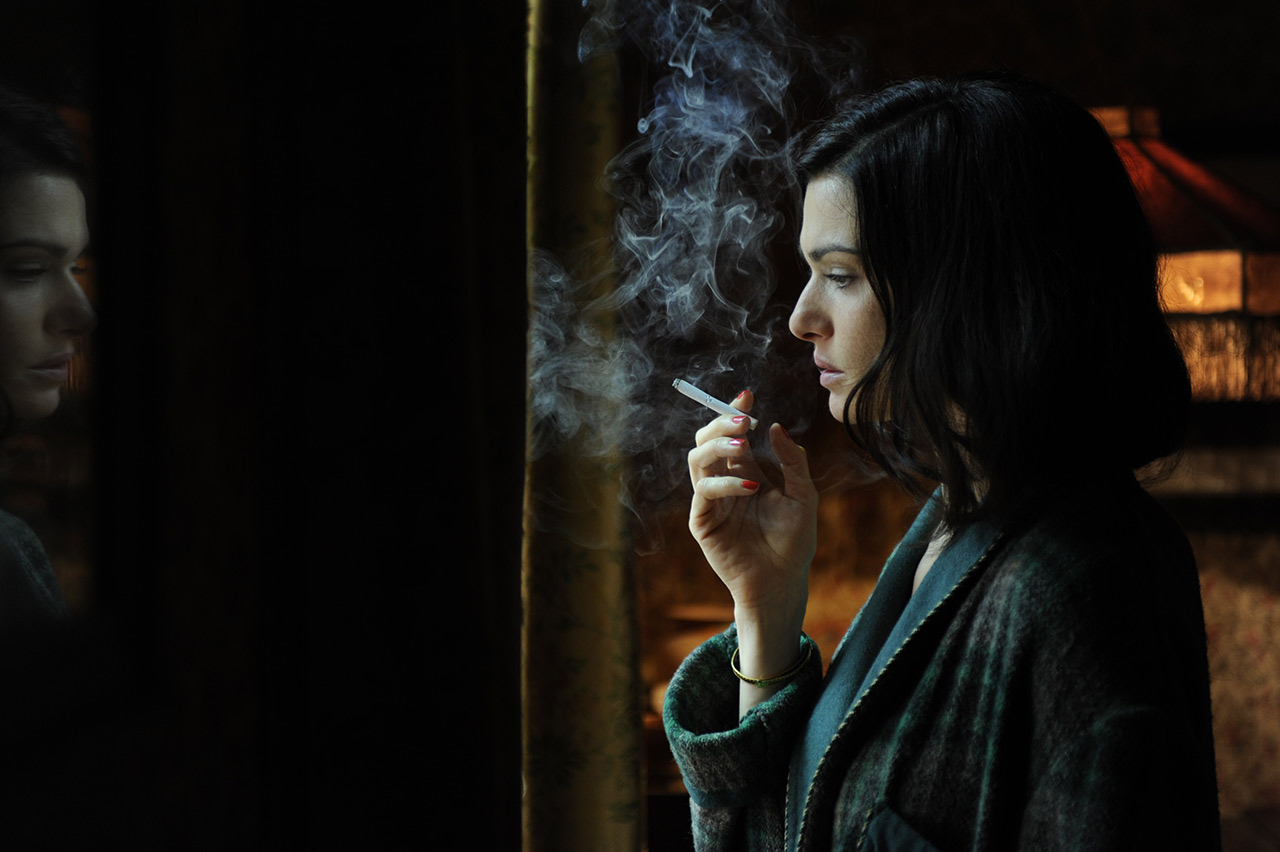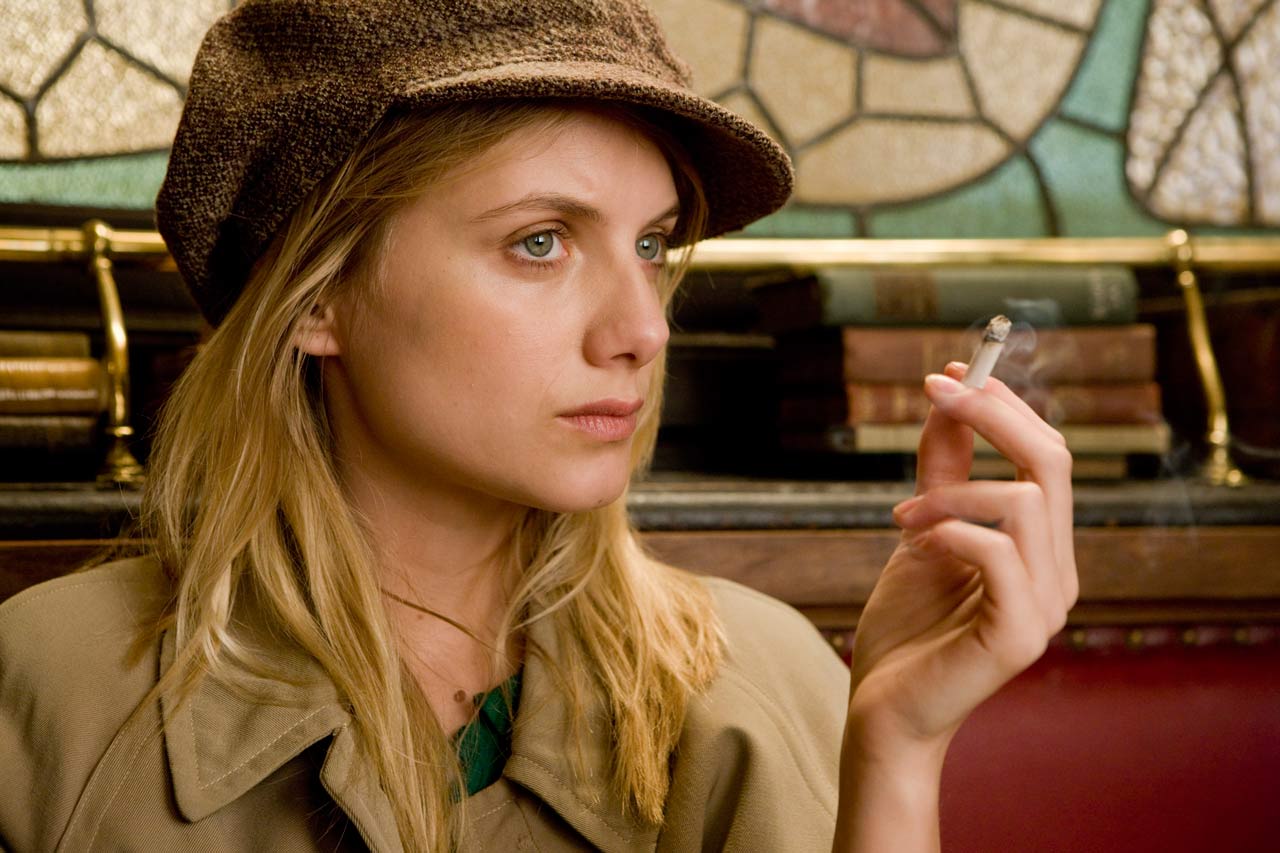Black Book

Paul Verhoeven has received some of the stupider film reviews in recent history. I'm still floored by the number of people who see Robocop as an endorsement of, rather than satire on, the idea of unfettered and uncompromising law enforcement. Robocop may be the ultimate bad L.A. Cop, but the storyline, which had Peter Weller playing an armored cyborg struggling to regain his humanity, was a far cry from Dirty Harry wish-fulfillment. (I'm assuming Verhoeven needn't be held accountable here for any number of unthinking meatheads who might have taken away from the film some kind of inspirational message about the validity of Rodney King tactics among police officers, but some viewers would doubtless argue that point.)
Robocop was a cult phenom and even a minor cause celebré among a certain type of movie critic. Verhoeven, his Dutch sensibility always veering toward the outré as far as American audiences were concerned -- and the visceral impact of Robocop came, no doubt, from Verhoeven's facility with the kind of brutally over-the-top action that earned X ratings from industry censors the MPAA -- made a real name for himself in the mainstream when he hooked up with screenwriter Joe Eszterhas and introduced the world to Sharon Stone's crotch in Basic Instinct. Thanks to a successfully lurid ad campaign, and another successful effort at editing its way to an R rating, Basic Instinct became a runaway hit, the kind of movie that retains the capacity to inspire an ill-advised sequel some 20 years after the fact. I admired a lot of Basic Instinct and found a lot of it pretty damn silly, but it seemed to confirm Verhoeven's interest in exploring the outer limits of genre. (Check out Flesh + Blood, a sword-and-sandals adventure with a rape fetish and a young, very naked Jennifer Jason Leigh, for more along those lines.) What it didn't indicate, though maybe it should have, was how far Verhoeven intended to go in the interest of setting fire to his next chosen genre — the backstage melodrama.
Again working with Eszterhas, and again intending to exploit an American fascination with tastefully mounted sleaze, Verhoeven mounted a lavish quasi-musical set in the glittery world of back-stabbing Vegas showgirls/strippers. He cast a wholesome TV actress in the lead and populated the film with more breasts and asses than had been seen in any recent Hollywood release. Even the ratings board would constitute no obstacle -- Showgirls would proudly fly its NC-17 flag at shopping-mall multiplexes around the country. Well, we all know how that turned out, from a box-office perspective at least. (And I believe Verhoeven must have been keenly interested in having people see these films -- it must be a frustrating experience to make movies like this if people suddenly decide to keep their buttons outside of pushing range.) There has been some degree of critical reevaluation in the intervening years. Jacques Rivette, of all people, proclaimed himself a fan, probably seeing another ferocious satire of American mores and morals somewhere in the work. He told critic Frederic Bonnaud (in an interview translated by Kent Jones): “It’s about surviving in a world populated by assholes, and that’s [Verhoeven’s] philosophy.” I think Rivette may be onto something there, although, blaming Eszterhas, I dismissed Showgirls on release as just too full of deliberate degradation-as-provocation to stomach.
Next up was Starship Troopers, an adaptation of a much-loved science-fiction touchstone and a return to the safety of big-budget studio adventures (the Schwarzenegger romp Total Recall had treated him pretty well) that seemed to qualify as a retreat from overtly provocative filmmaking. It’s hard to imagine that TriStar and Disney (whose Touchstone arm distributed the film outside the U.S.) really knew what they were in for, as Verhoeven, reunited with his Robocop screenwriter Ed Neumeier, delivered a rip-snorting war movie that sent sun-kissed, television-ready boys and girls on a propaganda-pumped and dehumanizing mission to kill an unknowable alien other. Starship Troopers also has a helping of sex, with soap-opera style love affairs brewing among the co-ed soldiers, and one scene taking place among boys and girls in a communal shower. Something about that scene really set some commentators off, and I stil don’t know if critics like Pulitzer Prize-winning (!) Washington Post writer Stephen Hunter were being deliberately obtuse when they described Starship Troopers as a fascist film. (You know your satire is working when the establishment critics can’t tell you’re joking.) It’s not a very good film — full of mediocre action and two-dimensional CG animation — but it’s a pretty good satire, and it finally tips its hand when Neil Patrick Harris shows up at the end wearing a black SS trenchcoat in a comic alien-torture scene that may prefigure Abu Ghraib and Guantanamo. The film suggests, in a sidelong way, that the bugs’ attack may actually be self-defense against an aggressive and deceitful earthling military force, and Verhoeven may be satisfied with himself for taking the piss out of the American can-do, I’m-from-Buenos-Aires-and-I-say-kill-em-all mentality a half decade before that mindset would enable the war in Iraq.
Starship Troopers seemed to catch its audience off-guard (the R-rated gore and nudity couldn’t have helped box-office prospects much in a country that generally prefers its sex and violence at a PG-13 level) and came off as only a minor hit and a financial disappointment. His follow-up, Hollow Man, was an intriguing but unsuccessful cross of amazing special-effects work with the half-baked story of a perverted invisible man. And that was the end of Paul Verhoeven in Hollywood.
I have to ask myself, now I’ve spent more than 900 words cataloging the man’s history as a studio filmmaker, what it is about Verhoeven’s career that has held my interest through so many mediocre pictures. (I rank only the sexless Robocop as a resounding success — one of the first-rank achievements in contemporary science fiction films.) I suppose the answer is his dedication to the provocative image — whether it’s ED 209 blasting the hell out of a corporate boardroom or Sharon Stone flashing beaver on the big screen or even Kevin Bacon feeling up the tit of a sleeping woman with one invisible hand, titillation is his stock in trade. He has a rather dim regard for the bulk of humanity, and making films that are stirring in their depiction of violence and sexuality helps him underline the base-level stimuli he sees all of us responding to — life is complex, but Verhoeven’s films are relatively simple. Verhoeven’s characters respond to sex and violence and anger and propaganda in ways that they’re barely able to control.
His best films to date have been the ones that are most on point — the ones that choose to highlight the shared humanity we’re in danger of losing rather than simply wallowing in the scorn and deviousness of assorted dismal personal and political relations. That’s why I’m a big fan of Robocop and its titular tin man in search of his own lost human soul. And that’s why Black Book, Verhoeven’s new Dutch-made film about love and death and helplessness during World War II, is his best film in 20 years. At its heart, it’s about the ways that war saps the spirit of people trying to negotiate their larger social struggles, and how extremism on both sides breeds hatred and mean-spiritedness.
Storywise, Black Book is just an old-fashioned wartime melodrama. There’s nothing particularly tricky going on — no multifaceted narrative that operates on one level as frat-boy action experience and on another as bitter comedy. It’s the story of a Jewish woman, Rachel (Carice van Houten, a striking and talented actress), living in hiding during the Nazi occupation of Holland. She contrives to cross over into liberated territory with her family, but their passage is ambushed and only Rachel survives. She hooks up with the Dutch resistance, dyes her hair blonde — in one slyly self-referential shot Verhoeven shows her coloring her pubic hair — and becomes a spy.
Because this is a Verhoeven film, Rachel must sleep with a high-ranking Nazi security officer in order to gain access to the German leadership in Holland. But Verhoeven is reluctant to portray the man, Ludwig Müntze, as a monster. He seems to be a pretty good lover, for a Nazi. He realizes she’s Jewish but declines to betray her secret. And he eventually comes out in favor of negotiations with the resistance — not a popular position for a Nazi to take.
It’s probably not a popular position for Verhoeven to take, either, but he’s already accustomed to being called a fascist sympathizer. He does make it clear that Müntze’s Nazi colleagues are very bad men indeed, but his target in Black Book is extremists on both sides of the political equation — the resistance fighters who refuse to believe that a man working for the Germans could have a conscience, and the Dutch citizenry who, after the war is over, label Rachel herself as a Nazi collaborator.
It’s a galling turn of events, since the film has already shown that the politically naïve Rachel isn’t much of an ideologue. She’s already lost her family and her identity — any shred of self has been stripped from her by circumstance. She comes across as a sort of sexed-up version of a D.W. Griffith heroine (I mean that as a compliment) who’s only been trying to do what she believes in her heart is good and just. That’s the set-up for Verhoeven’s big visceral climax (all of his films have one), where a nude Rachel has buckets of shit heaped upon her by the victorious resistance movement in a scene that feels like the more-vulgar flipside of the humiliating pig’s-blood sequence in Carrie. What good is a hard-won victory against the oppressors, Verhoeven wants to know, when the smug self-righteousness of authority taints the high ground claimed by the victors, who dance around giving you the finger and throwing doodie on your head as soon as the fighting stops?
Rachel doesn’t respond to the indignity by unleashing a telekinetic hell on her tormenters, but she does eventually claim some degree of rough justice in a denouement that crystallizes Verhoeven’s cynicism about the greed and bad faith of ordinary men faced with extraordinary circumstances. Verhoeven has been criticized for consistently and preposterously sexualizing his female characters, but this one, at least, largely pure of heart but still heartbroken, is the director’s surrogate.
The whole story is told in between bookends that depict an older Rachel living more or less happily in a Jewish kibbutz — but one ringed by barbed wire and patrolled by armed guards. Thus the film’s pointed final shot brings us, startlingly, up to date — as always, Verhoeven wants to remind us, we humans remain victims of our own extravagant intransigence. It’s a deliberately humanist gesture from a director too often accused of callous inhumanity.
Black Book has been chosen to close this year’s Film Comment Selects series next week at the Walter Reade Theater in New York City. Following those screenings, it opens April 6 in New York and Los Angeles. Posted by on February 23, 2024 1:05 AM


